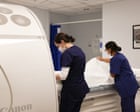NHSstaff have voiced concern about the growing numbers of patients who are filming themselves undergoing medical treatment and uploading it to TikTok and Instagram.
Radiographers, who take X-rays and scans, fear the trend could compromise the privacy of other patients being treated nearby and lead to staff having their work discussed online.
The Society of Radiographers (SoR) has gone public with its unease after a spate of incidents in which patients, or someone with them in the hospital, began filming their care.
On one occasion a radiology department assistant from the south coast was inserting a cannula into a patient who had cancer when their 19-year-old daughter began filming.
“She wanted to record the cannulation because she thought it would be entertaining on social media. But she didn’t ask permission,” the staff member said.
“I spent the weekend afterwards worrying: did I do my job properly? I know I did, but no one’s perfect all the time and this was recorded. I don’t think I slept for the whole weekend.”
They were also concerned that a patient in the next bay was giving consent for a colonoscopy – an invasive diagnostic test – at the same time as the daughter was filming her mother close by. “That could all have been recorded on the film, including names and dates of birth,” they said.
Ashley d’Aquino, a therapeutic radiographer in London, said a colleague had agreed to take photographs for a patient, “but when the patient handed over her phone the member of staff saw that the patient had also been covertly recording her, to publish on her cancer blog.
“AsNHSstaff we wear name badges, so our names will be visible in any video. It makes people feel very uncomfortable and anxious.”
Dean Rogers, the SoR’s director of industrial strategy and member relations, urged all NHS trusts and boards to ensure that patients know they need permission from staff before filming.
“As healthcare professionals we need to think: does that recording breach the confidentiality of other patients? Does it breach our ability to deliver care?”
Dr Katharine Halliday, the president of the Royal College of Radiologists, said: “In my experience, rules about filming and recording are there to protect the privacy and dignity of patients and staff and should be followed accordingly.
“In a clinical environment, you will be surrounded by patients in their most vulnerable moments, staff focusing on life-saving work and sensitive personal information. It’s important to be mindful of this and always seek permission for photography, filming or recording – even if it’s just for your own personal use.”
The Department ofHealthand Social Care was asked for comment.
